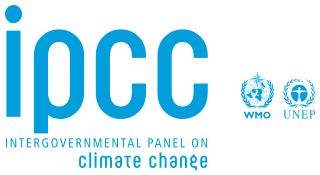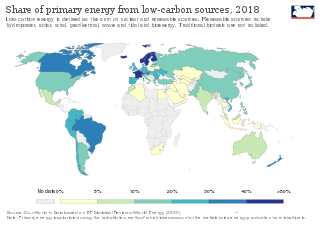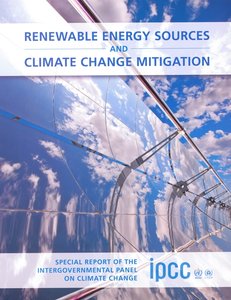
The Intergovernmental Panel on Climate Change (IPCC) is an intergovernmental body of the United Nations. Its job is to advance scientific knowledge about climate change caused by human activities. The World Meteorological Organization (WMO) and the United Nations Environment Programme (UNEP) set up the IPCC in 1988. The United Nations endorsed the creation of the IPCC later that year. It has a secretariat in Geneva, Switzerland, hosted by the WMO. It has 195 member states who govern the IPCC. The member states elect a bureau of scientists to serve through an assessment cycle. A cycle is usually six to seven years. The bureau selects experts in their fields to prepare IPCC reports. There is a formal nomination process by governments and observer organizations to find these experts. The IPCC has three working groups and a task force, which carry out its scientific work.

Energy is sustainable if it "meets the needs of the present without compromising the ability of future generations to meet their own needs." Definitions of sustainable energy usually look at its effects on the environment, the economy, and society. These impacts range from greenhouse gas emissions and air pollution to energy poverty and toxic waste. Renewable energy sources such as wind, hydro, solar, and geothermal energy can cause environmental damage but are generally far more sustainable than fossil fuel sources.

The Energy Research Centre of the Netherlands (ECN) is one of the largest energy research institute in Europe and holds a strong international position. With and for the market, ECN develops knowledge and technology that enable a transition to a sustainable energy system. The main office is located in Petten. ECN also has offices in Amsterdam, Eindhoven, Wieringermeer, Brussels and China. ECN has a staff of about 550 employees.

Climate change mitigation (or decarbonisation) is action to limit the greenhouse gases in the atmosphere that cause climate change. Climate change mitigation actions include conserving energy and replacing fossil fuels with clean energy sources. Secondary mitigation strategies include changes to land use and removing carbon dioxide (CO2) from the atmosphere. Current climate change mitigation policies are insufficient as they would still result in global warming of about 2.7 °C by 2100, significantly above the 2015 Paris Agreement's goal of limiting global warming to below 2 °C.

Carbon capture and storage (CCS) is a process in which a relatively pure stream of carbon dioxide (CO2) from industrial sources is separated, treated and transported to a long-term storage location. In CCS, the CO2 is captured from a large point source, such as a natural gas processing plant or coal power plant, and typically is stored in a deep geological formation. As of 2022, around 73% of the CO2 captured annually is used for enhanced oil recovery (EOR), a process in which CO2 is injected into partially-depleted oil reservoirs in order to extract more oil and then is left underground. Since EOR utilizes the CO2 in addition to storing it, CCS is also known as carbon capture, utilization, and storage (CCUS). Based on the limited field data available, the IPCC estimates that at appropriately-selected and well-managed storage sites, it is likely that over 99% of CO2 will remain in place for more than 1000 years.
The Science Subcommittee on Energy is one of five subcommittees of the United States House Committee on Science, Space and Technology.

A low-carbon economy (LCE) is an economy which absorbs as much greenhouse gas as it emits. Greenhouse gas (GHG) emissions due to human activity are the dominant cause of observed climate change since the mid-20th century. There are many proven approaches for moving to a low-carbon economy, such as encouraging renewable energy transition, energy conservation, electrification of transportation, and carbon capture and storage. An example are zero-carbon cities.

The Virgin Earth Challenge was a competition offering a $25 million prize for whoever could demonstrate a commercially viable design which results in the permanent removal of greenhouse gases out of the Earth's atmosphere to contribute materially in global warming avoidance. The prize was conceived by Richard Branson, and was announced in London on 9 February 2007 by Branson and former US Vice President Al Gore.

Geothermal power is electrical power generated from geothermal energy. Technologies in use include dry steam power stations, flash steam power stations and binary cycle power stations. Geothermal electricity generation is currently used in 26 countries, while geothermal heating is in use in 70 countries.

Low-carbon electricity or low-carbon power is electricity produced with substantially lower greenhouse gas emissions over the entire lifecycle than power generation using fossil fuels. The energy transition to low-carbon power is one of the most important actions required to limit climate change.

The United Nations Intergovernmental Panel on Climate Change (IPCC) published a special report on Renewable Energy Sources and Climate Change Mitigation (SRREN) on May 9, 2011. The report developed under the leadership of Ottmar Edenhofer evaluates the global potential for using renewable energy to mitigate climate change. This IPCC special report provides broader coverage of renewable energy than was included in the IPCC's 2007 climate change assessment report, as well as stronger renewable energy policy coverage.

Claudia Kemfert is a German economics expert in the areas of energy research and environmental protection. She is a Professor of Energy Economics and Sustainability at the Hertie School of Governance in Berlin. She heads the Energy, Transportation, and Environment department at the German Institute for Economic Research.

Bioenergy with carbon capture and storage (BECCS) is the process of extracting bioenergy from biomass and capturing and storing as much as possible of the resulting CO2, thereby moving it from the biogenic carbon pool to the geological carbon pool. BECCS can theoretically be a "negative emissions technology" (NET), although its deployment at the scale considered by many governments and industries can "also pose major economic, technological, and social feasibility challenges; threaten food security and human rights; and risk overstepping multiple planetary boundaries, with potentially irreversible consequences". The carbon in the biomass comes from the greenhouse gas carbon dioxide (CO2) which is extracted from the atmosphere by the biomass when it grows. Energy ("bioenergy") is extracted in useful forms (electricity, heat, biofuels, etc.) as the biomass is utilized through combustion, fermentation, pyrolysis or other conversion methods.
Greenhouse gas emissions are one of the environmental impacts of electricity generation. Measurement of life-cycle greenhouse gas emissions involves calculating the global warming potential (GWP) of energy sources through life-cycle assessment. These are usually sources of only electrical energy but sometimes sources of heat are evaluated. The findings are presented in units of global warming potential per unit of electrical energy generated by that source. The scale uses the global warming potential unit, the carbon dioxide equivalent, and the unit of electrical energy, the kilowatt hour (kWh). The goal of such assessments is to cover the full life of the source, from material and fuel mining through construction to operation and waste management.
Kristin Shrader-Frechette is O'Neill Family Professor, Department of Biological Sciences and Department of Philosophy, at the University of Notre Dame. She has previously held senior professorships at the University of California and the University of Florida. Most of Shrader-Frechette's research work analyzes the ethical problems in risk assessment, public health, or environmental justice - especially those related to radiological, ecological, and energy-related risks.

The contributions of women in climate change have received increasing attention in the early 21st century. Feedback from women and the issues faced by women have been described as "imperative" by the United Nations and "critical" by the Population Reference Bureau. A report by the World Health Organization concluded that incorporating gender-based analysis would "provide more effective climate change mitigation and adaptation."
Nebojsa Nakicenovic is an energy economist.
Frank Jotzo is a professor of environmental economics and climate change economics at the Australian National University's Crawford School of Public Policy where he leads the Centre for Climate and Energy Policy. He is the Head of Energy at the ANU Institute for Climate, Energy & Disaster Solutions and the Director for the ANU Zero Carbon Energy for Asia-Pacific Grand Challenge initiative. His research focuses on policy relevant aspects of climate change, energy transition, and broader issues of environment, development and economic reform.











